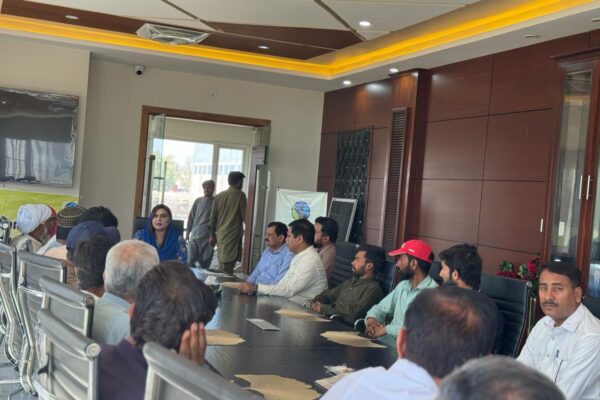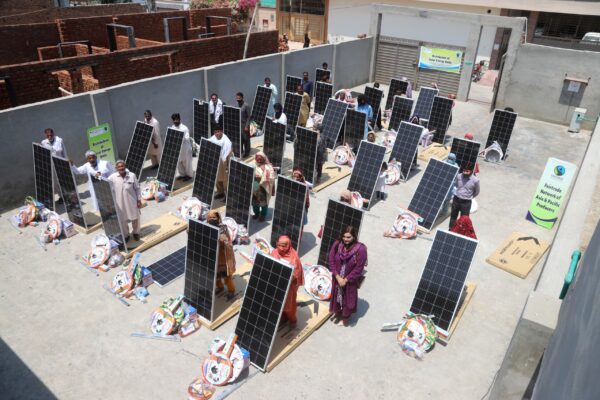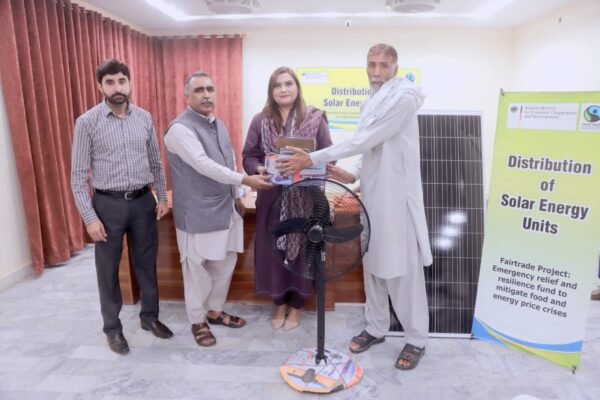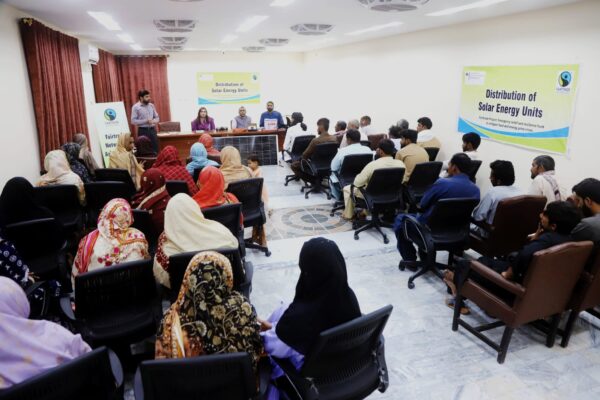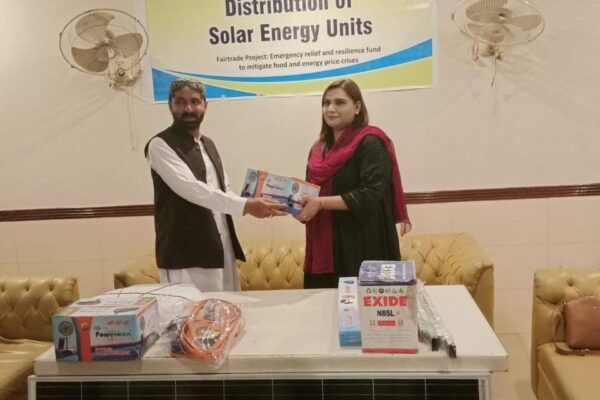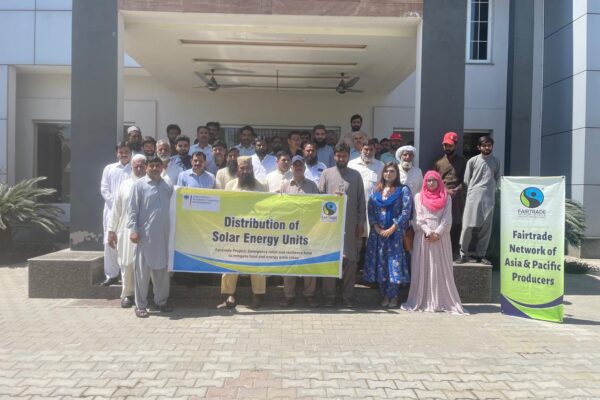Since 2020, the global landscape has been reshaped by the intersecting crises of COVID and climate change. These events have sent shockwaves through global markets by driving up global food prices by approximately one-third, fertilizer costs by more than half, and oil prices by nearly two-thirds. Formerly accounted for a significant portion of the world’s wheat, barley, and sunflower oil, the disruption in agricultural powerhouses like Ukraine and Russia with the Russian-Ukraine war has further exacerbated these challenges. With Russia and Belarus being major players in potash production, a crucial component of fertilizer, the ripple effects have been felt far and wide. This turmoil has had a direct impact on Fairtrade producers worldwide. They’ve faced pressures from soaring production costs, particularly in fertilizer and fuel, in addition to the limited access to their main markets. However, amidst these challenges, innovative solutions are emerging.

The solar panel for the fan and light is a blessing for my family. We live in an area where power outages are frequent. Now, we have a sustainable solution for our basic needs. Shami Mai, A women Farmer REEDS Rahim Yar Khan
In Pakistan, a targeted approach has been adopted to address the pressing issues faced by rice and cotton farmers amidst the country’s energy crisis. As part of the Emergency Relief and Resilience Fund by Fairtrade Germany, a two-phase plan has been put into action, focusing on distributing solar energy systems to enhance resilience and alleviate the burden of rising energy costs and frequent blackouts. Each Set consists of 9 items (1-Solar Panel Nominal 200-Watt,1-Charger Controller, 1-Terminal and Thimbles, 1-110/76mm cables and solar connectors, 1-Panel stand, 1-65amp wet battery, 1-DC pedestal fan, 2-DC LED light). These solar units, procured as part of the Solar Energy Units Procurement Project, serve as vital backups during power outages. This empowers households to redirect their financial resources towards essentials items such as food. Notably, this initiative contributes to the broader goal of transitioning to green energy for 4 rice and 1 cotton growing Fairtrade certified Producer Organizations (POs).
“Being part of the Atlas Fairtrade Farms Association has been an incredible journey for me. It’s more than just an affiliation; it’s a community of like-minded individuals striving for sustainable agricultural practices and equitable trade. Through Fairtrade NAPP’s initiatives like the solar distribution program, we not only receive practical support but also reaffirm our commitment to ethical farming and environmental stewardship. Together, as members of this association, we’re not just cultivating crops; we’re cultivating change for a better, fairer world.”- Rana Seed Akhter, Village Mari Thakran, Atlas Fairtrade Farms Association.
In the initial phase, 72 solar systems were distributed among the four producer organizations. The second phase witnessed the distribution of 140 solar systems, with equal 37 solar energy units among the 4 producer organizations, namely, Masoom Support Foundation, hope Farmers Association, Atlas Farm Foundation and REEDs Farmers Association. By enhancing access to reliable energy, these efforts boost the resilience of 127 male and 21 female producers and their agricultural systems by positioning them to weather future shocks and stresses in the aspects of food, energy, and finance.
Aligned with the overarching objectives of the Emergency Relief and Resilience Fund by Fairtrade Germany to mitigate crises related to food and energy prices, This Fairtrade’s initiative contributes to the two main key outputs. At first, they facilitate the strengthening of local food systems (for both production and processing) in close proximity to small-scale farmers. Secondly, such initiatives empower stakeholders within these local food systems by enhancing their capacities in the agri-food sector.
In total, Fairtrade’s interventions as part of the Emergency Relief and Resilience Fund by Fairtrade International have aimed to benefit 80 smallholder farmer producer organizations (POs) across 14 countries in Africa, Asia-Pacific, and Latin America with a total of 13,566 direct beneficiaries, including 39% women. Through an estimated average household size of 5 people, the additional indirect beneficiaries of these interventions are approximately 54.264 people.
Testimonies:
“As a registered farmer of the Atlas Fairtrade Farms Association, I am deeply grateful for the initiative taken by Fairtrade NAPP in distributing solar sets to small farmers like myself. This solar distribution program not only upgraded our households but also brightens our future. With access to sustainable energy, we are empowered to enhance our agricultural practices, improve our livelihoods, and contribute positively to our communities. Fairtrade’s commitment to supporting small-scale farmers resonates profoundly with us, and this initiative is a testament to their dedication to our well-being and the environment.” -Abdul Jabbar, Village Mari Thakran, Atlas Fairtrade Farms Association.
“Due to financial constraints, my electricity bill went unpaid, leading to a disconnection of the power supply. However, the installation of a solar panel swiftly resolved this issue, restoring tranquility and convenience to my household. Now, with stable electricity, I can enjoy uninterrupted rest and leisure. Additionally, this newfound stability amplifies my capacity to engage in farming activities, promising increased income potential.” – Muhammad Ameen.
“Balancing farm work with daytime stitching, my embroidery aspirations languished in the dark. Now, with solar panels, I can extend my workday into the night, cultivating both skills and income. The transition from day to night work has transformed possibilities, bridging the gap between ambition and accomplishment. Illuminated by this newfound opportunity, I embrace the chance to fully realize my creative potential and secure a brighter future.”- Nadia.
“It’s a remarkable shift to finally have electricity, courtesy of solar panels, after years of farming. These lights not only illuminate our home but also brighten our prospects for the future. Previously, load-shedding woes hindered my ability to educate my children after their school hours, but now, thanks to solar power, this obstacle is effortlessly overcome. With dependable electricity, my children now find studying during the day much more conducive to their learning.” – Misbah Rashid.
“As a smallholder farmer, grappling with rising inflation and escalating electricity costs forced us to limit our usage. However, with the installation of a solar panel, I now have the freedom to use a fan and light constantly without worry, while also enjoying greater savings compared to before.” – Muhammad Tufail. 


